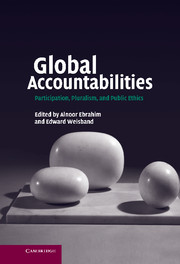Book contents
- Frontmatter
- Contents
- List of tables
- List of figures
- Acknowledgments
- List of contributors
- 1 Introduction: forging global accountabilities
- Part I Public accountability: participatory spheres from global to local
- 2 Multilateralism and building stronger international institutions
- 3 Global financial governance and the problem of accountability: the role of the public sphere
- 4 Citizen activism and public accountability: lessons from case studies in India
- Part II Experiments in forging NGO accountability: mutuality and context
- Part III Reflective accountability: new directions for participatory practices
- Part IV Global accountability frameworks and corporate social responsibility
- Index
- References
2 - Multilateralism and building stronger international institutions
Published online by Cambridge University Press: 22 September 2009
- Frontmatter
- Contents
- List of tables
- List of figures
- Acknowledgments
- List of contributors
- 1 Introduction: forging global accountabilities
- Part I Public accountability: participatory spheres from global to local
- 2 Multilateralism and building stronger international institutions
- 3 Global financial governance and the problem of accountability: the role of the public sphere
- 4 Citizen activism and public accountability: lessons from case studies in India
- Part II Experiments in forging NGO accountability: mutuality and context
- Part III Reflective accountability: new directions for participatory practices
- Part IV Global accountability frameworks and corporate social responsibility
- Index
- References
Summary
International institutions are facing a double challenge of effectiveness and legitimacy. Many dissatisfied or disenfranchised governments and groups are deeply affected by global governance yet feel governance is poorly executed and that they themselves are inadequately represented. As global governance expands, few can hold those who exercise power to account. The implications for democracy are profound. Within the boundaries of the state people enjoy at least a potential to hold their governments to account through elections, ombudsmen, court actions, nongovernmental agencies, and the media. Yet increasingly, governments are delegating or ceding control over such decisions to international organizations, networks or other actors. This means that even in democracies, governments cannot be held to account for a widening range of decisions.
The institutions of global governance are mostly intergovernmental. They are constructed to represent member states and to provide a forum for discussion, agreement, and multilateral cooperation. In global governance, no actor can claim to have been directly elected by voters. Nor are many institutions subject to the normal restraints or checks and balances of public office. Multilateral organizations grapple with an unwieldy structure of government representation behind which most decisions are made by a small group of powerful states using a combination of formal and informal influence. As a result, accountability in global governance is complex and difficult to achieve.
The most deeply affected or disenfranchised are peoples in developing countries.
- Type
- Chapter
- Information
- Global AccountabilitiesParticipation, Pluralism, and Public Ethics, pp. 27 - 44Publisher: Cambridge University PressPrint publication year: 2007
References
- 5
- Cited by

